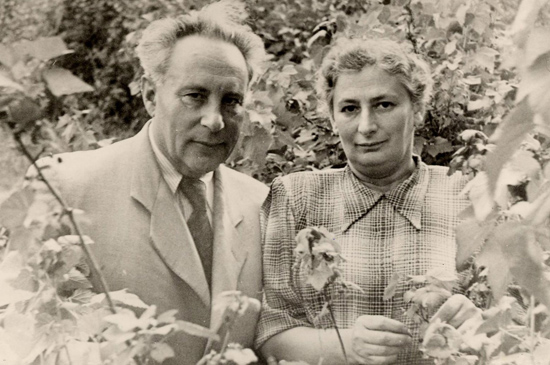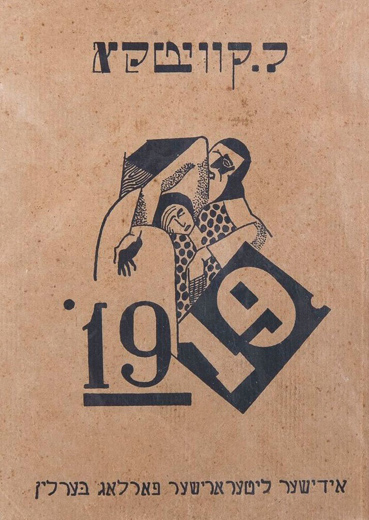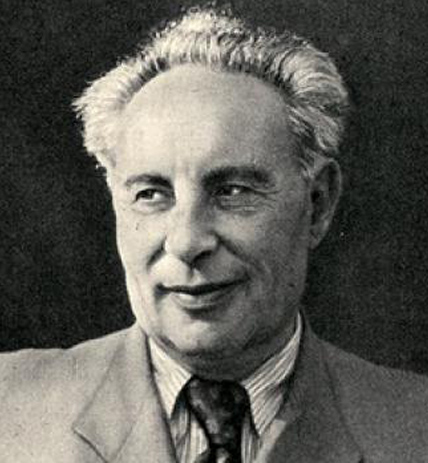Kvitko, Leib
Kvitko, Leib or Lev [Квітко, Лев], b 15 October 1890 in Holoskiv, Podilia gubernia, d 12 August 1952 in Moscow. Yiddish poet and novelist. Kvitko gained wide recognition primarily for his works of children's literature. Together with the poets David Hofstein and Perets Markish he made up the so-called Kyiv lyric triad of Yiddish poets (or Kyiv Group). They displayed an affiliation with the contemporaneous modernist movements among Ukrainian writers who aspired to blend European sensibilities with their own national essence, albeit with an evident impact from the Russian symbolist circles. In 1915, in Uman, Kvitko met the Jewish writer David Bergelson, who introduced him to literary circles. In May 1917, Kvitko made his literary debut by contributing to the socialist newspaper Dos Fraye Wort. In 1918, he, as an active member of the Kultur Lige, published in Kyiv a book Lidelekh (Songs). His poem ‘Royter shturm’ (The Red Storm, 1918) was the first Yiddish work about the October Revolution of 1917. From 1920 to 1925 Kvitko lived and published in Germany (Berlin and Hamburg), where he became a member of the German Communist Party and participated in the underground. In 1922–3, he published two collections Gringroz (Green Grass) and 1919. Fearing arrest, in 1925 he returned to the USSR, where he became a member of the editorial board of the magazine Di Royte Velt and published a series of stories about life in Hamburg. From 1926 to 1936 he lived in Kharkiv and wrote mostly children’s stories and poems. He was also at this time a member of Vaplite (Free Academy of Proletarian Literature) and later Prolitfront. His satirical poems (caricatures) were later included in the book Gerangl (Battle, 1929).
In September 1929, the Yiddish Section of the All-Ukrainian Association of Proletarian Writers (VUSPP) held an extraordinary meeting to address Kvitko’s perceived ‘anti-communist pasquinade.’ During this meeting, they called for his immediate dismissal from his position at Di Royte Velt. In October 1929, Kvitko found employment as an apprentice lathe operator at the Kharkiv Tractor Plant. The poet drew upon his experience working at the factory to inspire his writing, and in 1931, he published a new book titled In trakter tsekh (In the Tractor Shop). From 1936 he lived in Moscow. His Hecklibene verk (Selected Works, 1937) already met all of the requirements of socialist realism. In 1941, in Kaunas, which had only recently come under Soviet rule, the entire edition of his autobiographical novel in verse Yunge yorn (The Years of Youth), on which the author had been working for 13 years, was destroyed. During the Second World War, Kvitko was a member of the editorial board of the newspaper Einikayt (Unity) and, in 1947–8, of the literary and artistic almanac Heimland (Homeland). His collection of poems Fayer af di sonim (Fire on the Enemies,1941) and others called for the fight against the Nazis. Furthermore, his poems from 1941 to 1946 were included in the collection Gezang fun mayn gemit (Songs of My Soul, 1947). During the Stalinist purges of Jewish culture, Kvitko was arrested in Moscow in 1949 in connection with the so-called ‘affair of the Jewish Anti-Fascist Committee,’ imprisoned, and subjected to torture. On August 12, 1952, together with other Yiddish cultural figures, all members of the Jewish Anti-Fascist Committee, he was executed in the Lubianka Prison in Moscow during what is sometimes referred to as ‘the Night of the Murdered Poets.’ He was posthumously ‘rehabilitated’ in 1954.
Four collections of his works were translated into Ukrainian (among others, by such major poets as Pavlo Tychyna, Maksym Rylsky, and Volodymyr Sosiura) and published in 1930–2 and 1958.
BIBLIOGRAPHY
Estraikh, G. ‘The Kharkiv Yiddish Literary World, 1920s–mid-1930,’ East European Jewish Affairs 32, no. 2 (2002)
Antolohiia ievreis'koï poeziï. Ukraïns'ki pereklady z ïdyshu (Kyiv 2011)
Larysa Bilous
[This article was written in 2023.]



